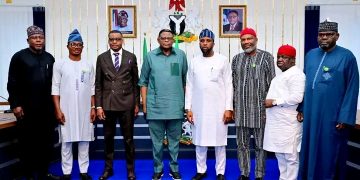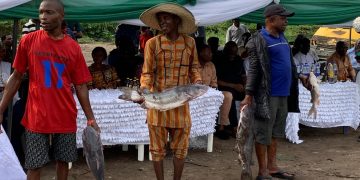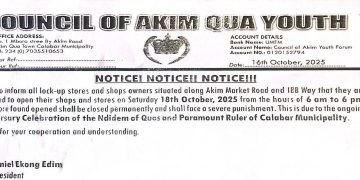By Akanimo Felix
The Governor of Cross River State, Bassey Otu, has called for urgent reform of laws regulating the ownership and management of solid minerals, insisting that the current framework denies states and host communities the benefits of their resources.
The demand comes at a time the state’s mining sector is enmeshed in controversies, ranging from allegations of illegal operations to ongoing litigation involving prominent politicians and security agencies.
Otu made the call yesterday when members of the House of Representatives Committee on Solid Minerals led by its chairman, Gaza Jonathan, paid him a courtesy visit at Government House, Calabar.
The governor, who lamented the restrictions imposed by the 1999 Constitution and the Nigerian Minerals and Mining Act, 2007, noted that the exclusive control vested in the Federal Government was stifling states’ economic growth despite their mineral endowments.
“Cross River is blessed with limestone, granite, gold, uranium, barite, iron ore, kaolin, manganese and many more in commercial quantities. For now, this is a dream yet to come true because of the legal bottlenecks,” Otu said.
He urged the National Assembly to consider amendments that would place solid minerals under the residual legislative list, thereby giving states more control over exploration and revenue, while ensuring fair compensation for host communities.
The governor also raised concerns about environmental degradation from illegal mining, arguing that while the Federal Government takes huge revenues from minerals, “locals are constantly blighted by air and water pollution.” He said his administration had set up an Anti-illegal Mining Taskforce to curb sharp practices in the sector.
The call comes amid controversy over mining rights in the state. A former House of Representatives member, Daniel Asuquo, recently dragged Otu, the state government, the Attorney General, the Anti-illegal Mining Taskforce Chairman, Paul Effiong, and nine others before the Federal High Court in Port Harcourt, alleging encroachment on his mining sites.
The suit, filed on August 12, 2025, also listed the Nigeria Police, the Nigeria Security and Civil Defence Corps, and the Nigerian Army as respondents.
Responding, Gaza Jonathan said the committee’s visit was to monitor compliance with the Minerals and Mining Act and the Explosives Act, as well as to participate in a Solid Minerals Expo in the state.
He condemned illegal mining and the exploitation of host communities, stressing the need for remediation and reclamation of sites after exploration. “We must take a critical look at how our people are actually getting their share of the minerals being exploited,” he said.
Gaza further urged the state government to formalize community consent processes in mining agreements to promote transparency, accountability and sustainable development.
























